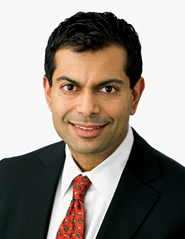Wholesaler Citadel is growing again.
And this time it isn’t on its Over-the-Counter desk. Now the firm is building out a low-touch electronic institutional business, Jamil Nazarali, senior managing director and head of Citadel Execution Service told Traders Magazine during a recent interview. The nascent business, stated only a year ago, already claims a few high-profile buyside accounts as its customers.
“We are getting traction, the business is growing and doing well,” Nazarali told Traders Magazine. “We already have two of the top 10 blue chip buyside asset managers trading with us, with others in the pipeline.”

Nazarali heads up the institutional business, which has about a dozen traders and staff, along with chief operating officer Matt Culek. The two head up other businesses that fall under the Citadel sphere as well. Citadel has three businesses: retail market making and wholesaling, an institutional algorithm business and an ATS where buyside institutions can interact with the firm’s retail flow.
At present, the institutional group operates under an agency-only model, doesn’t manually handle any order flow and doesn’t commit capital. It is strictly a low-touch electronic business whereby the buyside accesses and trades through Citadel algorithms on a self-service basis. Citadel does provide electronic sales trading help, however. However, Nazarali said that some Citadel clients have asked the firm to commit capital – especially on the tail end of an order that hasn’t been filled via an algorithm.
The firm is offering a handful of core algorithms to clients – VWAP, TWAP and POV. But it also offers more customizable liquidity seeking algorithms called Mercury and Mercury Dark (for trading offboard.) Nazarali said its growth strategy centers on its Mercury and Mercury Dark algorithms.
Lastly, the desk is looking to increase order fills by routing more to its Apogee dark pool, where both newer institutional and existing retail order flow rests, and its other businesses. Citadel is one of the five largest wholesale market makers, trading 3.2 billion shares in January, for instance, according to data from Thomson Transaction Analytics. Nazarali declined to disclose how much volume is executed in Apogee.
While Citadel hopes to connect institutional orders with other institutional orders, part of Nazarali’s strategy is to match institutional orders to its retail order flow in Apogee. This is something other wholesalers like Knight Capital do and is a natural fit for Citadel, he added.
“By bringing together our retail flow with natural institutional flow sourced from a wide variety of venues, we offer deep and diverse access to liquidity for our clients” he said. “Accessing that liquidity intelligently, using speed, short-term alpha, and market savvy results in algorithms that differentiate us from our competitors.”
Nazarali said this part of its growth strategy centers on the growth of its IOC Business – the usage and implementation of “immediate or cancel orders.” This business relies on crossing institutional business with both its dark pool or against its retail order flow.
How does he plan to do this?
Nazarali told Traders Magazine that since last year Citadel has begun making markets in 18,000 additional OTC securities across 30 countries. Citadel now makes markets in all 26,000 exchange-listed and OTC securities. This compares to only 8,000 exchange-listed securities in a select few countries early last year. The thinking goes that by offering market making and execution services on more securities, especially ones that are more thinly traded, the firm can increase its reach to existing customers as well as reach new ones.
“By offering market making in all securities we can now meet all our current and future customers’ equity trading needs,” Nazarali said.




